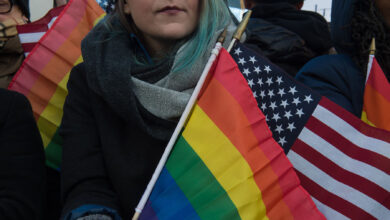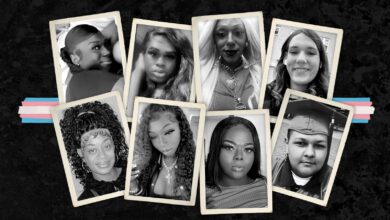10 Years After Obergefell, LGBTQ Families Celebrate Progress and Face Ongoing Challenges
Anniversary highlights gains in marriage equality and continued fight for LGBTQ rights.

On June 26, 2025, LGBTQ families, allies and advocates across the country are celebrating the 10-year anniversary of the U.S. Supreme Court’s historic ruling in Obergefell v. Hodges, which guaranteed the national freedom to marry for same-sex couples. The Court affirmed that banning same-sex marriage is a violation of the equal protection clause under the 14th Amendment of the U.S. Constitution, securing legal recognition and rights for millions.
Since the ruling, marriage equality has brought “assurance and security to millions of LGBTQ people and their families; and helped build understanding, empathy, dignity, and respect for the community,” according to GLAAD, the world’s largest LGBTQ media advocacy organization.
In a statement marking the anniversary, GLAAD President and CEO Sarah Kate Ellis (she/her) said, “A decade into marriage equality two things remain clear: The Obergefell decision helped protect families and strengthen communities across the country. And a majority of Americans continue to support the freedom to marry, because they understand that love is love, and we all deserve that freedom.”
Ellis also addressed the broader political landscape for LGBTQ Americans in 2025, particularly transgender people. “In 2025, LGBTQ people, in particular transgender people, are up against threats to our freedom: right-wing disinformation, and threats and bans on lifesaving healthcare most acutely,” she said. “Just as Obergefell helped Americans understand that love and families should not be up for debate, our identities, our right to feel safe walking down the street, and our ability to access healthcare should not be up for debate either.”
“LGBTQ Americans, like all Americans, deserve a government that protects and values all people and all families equally, with no exceptions,” Ellis said.
Adam Polaski (he/him), communications and political director at the Campaign for Southern Equality, also reflected on the significance of the day.
“Ten years ago today, laws on marriage for same-sex couples were finally settled — and over the past decade, Americans have moved on, with the decision becoming deeply ingrained in our country and culture,” Polaski said. “The freedom to marry has helped millions of Americans take care of each other, build stability, and plan for the future. Nowhere is that clearer than in the South, where hundreds of thousands of people are leading lives that are strengthened by the freedom to marry. As we celebrate this tenth anniversary, our team is proud to have been a part of this historic movement, and we will continue working toward the lived and legal equality of LGBTQ+ people all across the South.”
Public Opinion and Support
Public support for marriage equality has steadily increased since 2015. A 2025 Gallup poll shows that 68% of Americans support marriage for same-sex couples, near a record high. Republican support reached 55% in both 2021 and 2022 and now stands at 46%, compared to 83% of Democrats and 74% of independents.
A June 2025 poll by Centerline Liberties and Project Right Side found that “56% of Republicans said they supported allowing same-sex couples to marry, and 63% of Republicans said they believe a person who supports same-sex couples marrying can still be considered a Republican.”
The Public Religion Research Institute’s 2025 survey found “67% of Americans support marriage for same-sex couples, including majorities in every single state and the District of Columbia.” Even in states where anti-marriage constitutional amendments are still on the books, support reached 63%.
Families, Children and Economic Impact
The Williams Institute at UCLA estimates that there are currently 823,000 married same-sex couples in the United States—more than double the number from 2015. These couples are raising nearly 300,000 children.
In total, “2.6 million LGBTQ Americans are raising children,” and “more LGBTQ people are raising families in the South than anywhere else in the country,” according to the Movement Advancement Project and the Campaign for Southern Equality.
Wedding-related spending by same-sex couples has totaled $5.9 billion from 2015 through 2025, according to a June 2025 analysis by the Williams Institute.
Global Marriage Equality
According to Pew Research Center data released this month, “approximately 40 jurisdictions around the world now allow marriage for same-sex couples.” This means that “1.34 billion people (nearly 18% of the global population)” live in places where same-sex couples have the freedom to marry.
Legal Protections and the Political Landscape
In 2022, Congress passed the Respect for Marriage Act. The legislation “repealed the discriminatory Defense of Marriage Act and ensures that legally married same-sex and interracial couples are entitled to the same protections and recognition from the federal government as all other married couples.” It also guarantees that “those marriages will be respected in other states regardless of where a married couple lives or travels.”
The Act ensures “more than 1,100 protections on the federal level that help keep families together, from spousal benefits to hospital visitation rights to acknowledgment on death certificates and more.”
In the November 2025 election, voters in Colorado, California and Hawaii “enshrined marriage equality and/or permanently erased anti-marriage statutes”—demonstrating that Americans support marriage equality not just in polls, but at the ballot box.
GLAAD’s Accountability Project has tracked “more than 260 anti-LGBTQ statements and actions by the Trump administration.” Former President Donald Trump appointed three justices to the U.S. Supreme Court who voted to overturn Roe v. Wade. Associate Justice Clarence Thomas called for Obergefell, Lawrence, and Griswold to be “reconsidered.”
In October 2020, Justices Thomas and Samuel Alito “issued a formal rebuke of Obergefell on the Court’s opening day.”
Although there is currently no marriage case before the Supreme Court, LGBTQ advocates are watching other key rulings. These include Mahmoud v. Taylor, concerning bans on LGBTQ-themed books in schools, and Kennedy v. Braidwood Management Inc., which addresses access to preventive health care, including HIV medication.
Last week, the Court ruled in U.S. v. Skrmetti to uphold a Tennessee law banning hormone medications for transgender youth, even though those medications remain available for cisgender youth.
As the nation reflects on a decade of marriage equality, LGBTQ leaders are emphasizing both celebration and continued advocacy. The Obergefell decision marked a major victory—but not the end—of the fight for full equality.










